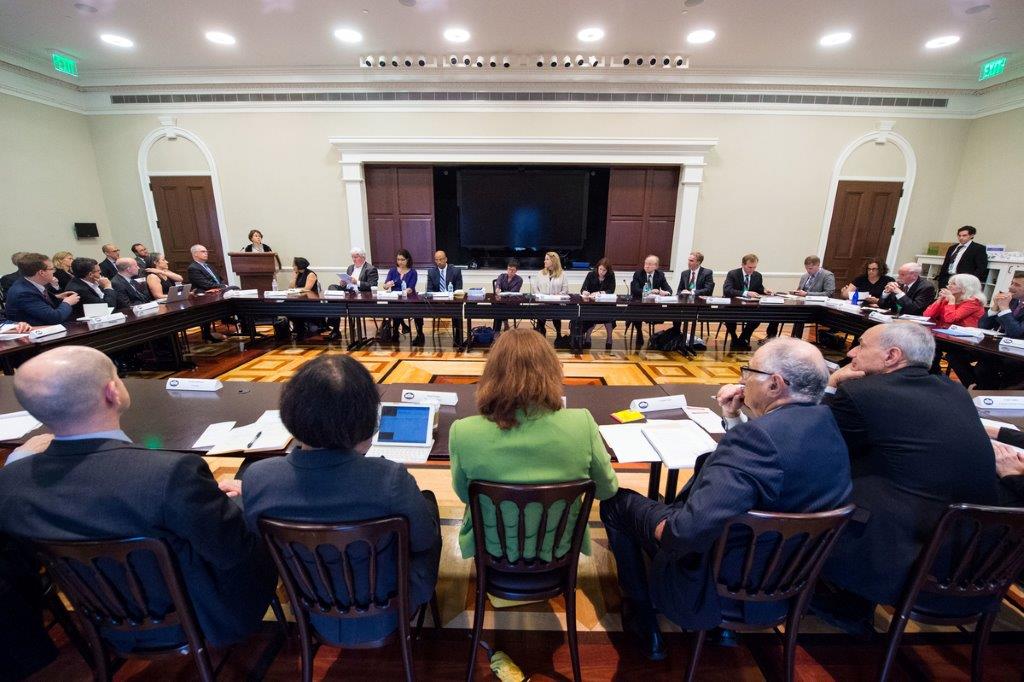
In the age of big data and disruptive technologies, we can unlock the potential for government to think smarter and engage with businesses, civil society, and citizens in new ways to achieve meaningful social impacts.
The Administration, along with state and local governments across the country, has been working to develop new tools and approaches that are ushering in an era of government innovation and delivering better results. Last week at the White House, the Domestic Policy Council, the Office of Science and Technology Policy, the Office of Management and Budget, and the U.S. Digital Service hosted leaders representing all levels of government as well as academics, community organizations, philanthropy, impact investors, and technologists who are advancing a series of new tools that are helping government to drive better outcomes.

Together, the Administration and these leaders are championing new innovations that can effectively achieve the outcomes that citizens want and deserve, including:
- New technology solutions, such as “smart” asthma inhalers that pinpoint hotspots for improved air quality, or digital government platforms that put state services in the palm of every citizen’s hand.
- New funding approaches that focus on outcomes instead of processes, from Pay for Success, where government pays for social outcomes once they are achieved, to prizes that enable the government to rollout challenges and pay only for successful products.
- Open government efforts, such as the White House Police Data Initiative, that open up never before released information that help build trust and accountability in government.
- Evidence-based efforts, such as evidence clearinghouses are identifying the interventions that continually achieve better results for those they serve, and tiered evidence grant programs that help promising programs with small grants to grow and build evidence while awarding larger grants to programs with strong evidence to help them scale.
- Place-based initiatives, from Promise Zones and the My Brother’s Keeper Community Challenge, to the newly launched Performance Partnership Pilots for Disconnected Youth (P3), that are bringing innovative approaches to cross-silo problem solving, focused on achieving results and empowering local communities.
What all these programs have in common is that they are bringing new solutions that can better, more reliably, or more quickly achieve the results citizens want and deserve. In short they are were created to deliver better outcomes.
A Challenge and an Opportunity for Innovation
Government social service funding can sometimes be over-focused on compliance, with an emphasis on tracking spending and prescribing processes that service providers must follow rather than calling for the outcomes we’d like them to achieve. Focusing on compliance alone or, for example, an overemphasis on tracking spending rather than outcomes, may obscure our goals, discourage innovation and thereby inhibit progress. That is why this Administration has taken several steps to help shift to a greater emphasis on outcomes and to encourage innovation.
Each of the innovative approaches noted in the bullets above addresses this core challenge and drive to outcomes in different ways: New technologies enable faster and more reliable services and information sharing. Funding innovations are enabling government to pay for outcomes rather than compliance and process. Evidence-based policy efforts are identifying the interventions that are best at achieving outcomes. Better use of data and application of data science is enabling us to understand and track outcomes in ways that were not previously possible. Place-based initiatives are breaking the compliance silos in community enabling them to more holistically drive to outcomes communities seek.
Beyond these areas, we’ve set new, government-wide policies to better emphasize outcomes. These include: requiring each major Federal agency to focus their strategic objectives on outcomes; annually assessing agency progress using the best available evidence; and reforming grants management regulations to encourage programs to incentivize grant recipients to focus on outcomes, while taking a risk-based approach to guarding against waste fraud and abuse.
A New Framework for Government Innovation: The Outcomes Mindset
Last week’s event we took stock of our progress across these individual areas of innovation noted above (evidence-based policy, place-based initiatives, data science, civic tech, procurement innovation, performance, etc). Participants identified ways these new tools can and are complimenting one another, and thereby achieving even better results.
We also discussed a new framing that is the common connector among all of these approaches: a core focus, central to the DNA of each, on achieving better outcomes.
By doing more to adopt an outcomes mindset, government will be better positioned to achieve results, remove barriers to progress, and to move the needle on communities’ biggest challenges. The innovations highlighted above, and others, offer new tools that make this vision more achievable than ever. We can use these strategies to transform public sector policy making and spending to advance the programs that deliver increased social impact.
By focusing more intentionally on desired outcomes, leaders from across government and the social sector are already identifying and using the twenty-first century solutions that can transform service delivery and strengthen citizens’ connection to government.
Transitioning to an outcomes mindset will often represent a challenging shift for government. Achieving this systems change will not be easy, but in the different initiatives noted above, we have helped lay the groundwork for a government that has the procurement, data, and technical tools to measurably improve outcomes in communities across the country.
Announcements and New Commitments
This important work continues to gain momentum. The Administration, along with several organizations taking part in last week’s convening, announced new commitments that promote an outcomes mindset. You can read about them here.
The Administration will continue to build on this momentum and to work with partners at all levels of government and beyond so that we can better, more reliably, and more quickly achieve the results citizens want and deserve.



